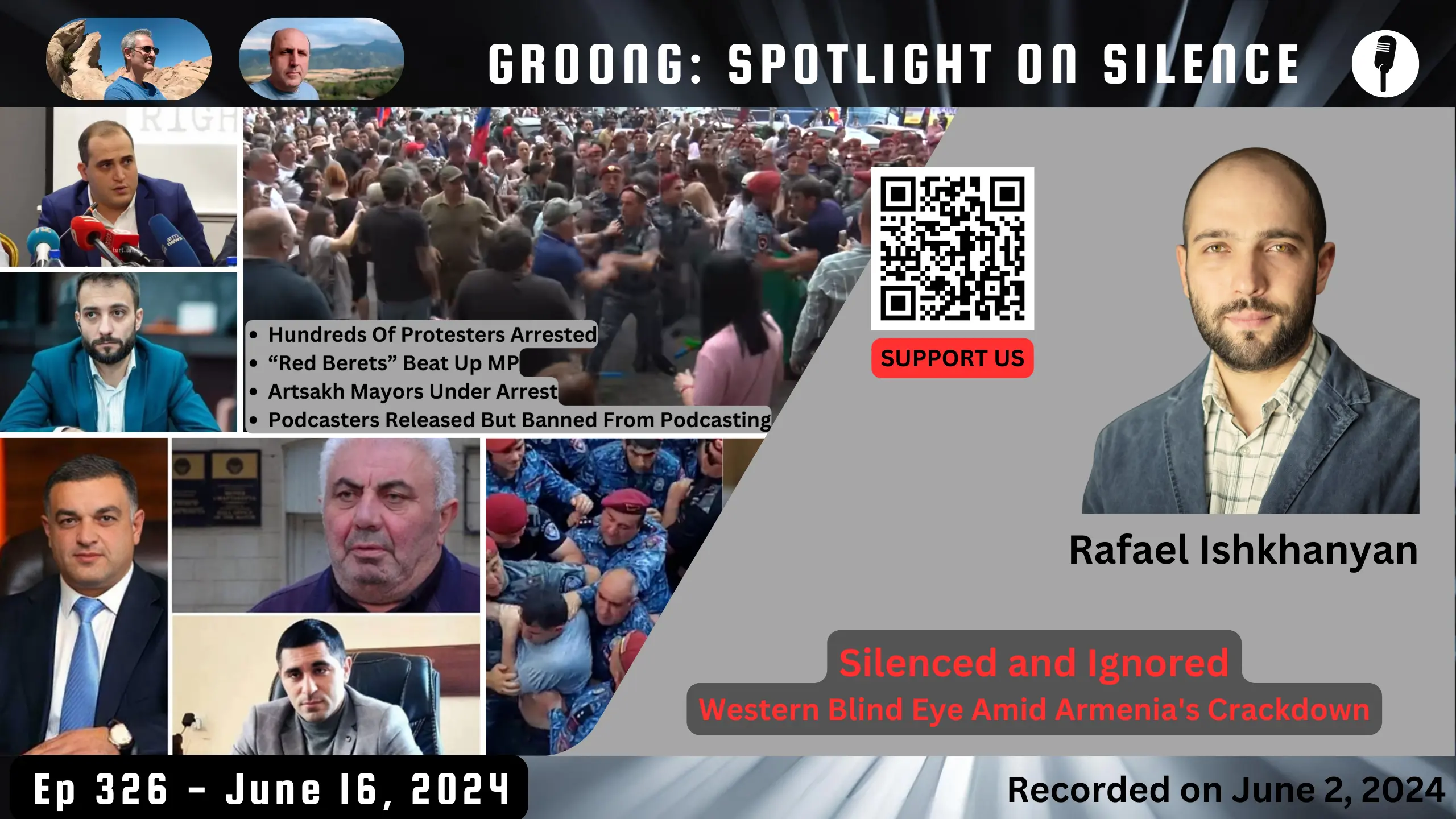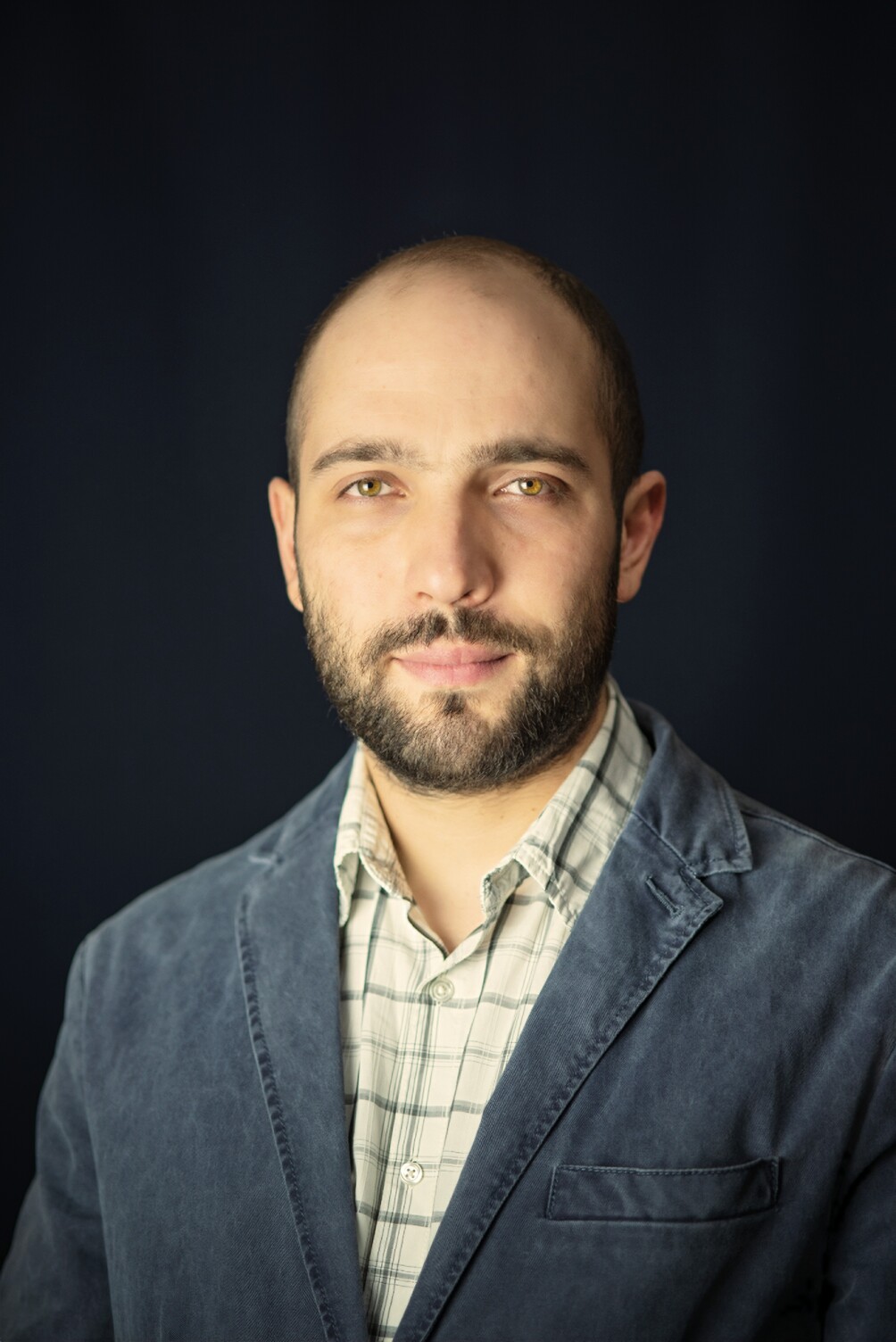Rafael Ishkhanyan - Protesters Arrested, MPs Beaten, Artsakh Mayors Jailed | Ep 336 - Jun 16, 2024 [EP336]
Posted on Monday, Jun 17, 2024 | Category: Armenia, Spotlight on Silence, Political Prisoners | Series: SOS, video
Groong Links:
Topics:
- Detention vs. Arrest
- Hundreds Of Protesters Arrested
- “Red Berets” Beat Up MP
- Artsakh Mayors Under Arrest
- Podcasters Released But Banned From Podcasting
- Narek Samsonyan
- Vazgen Saghatelyan
Guest:
Episode 336 | Recorded: June 16, 2024
Show Notes
Types of Arrest or Detention in Armenia
During the recent anti government protests in Armenia hundreds have been arrested, and since we hear many terms used for these arrests, we thought we should talk about the various types of arrests and detentions and their specific uses. For example, since most protesters in Armenia are held for 3 hours, this usually falls under something called Administrative arrest. Well, what is that, and what are the types of arrests available to law enforcement agencies in Armenia?
- Apprehension (բերման ենթարկել), is when someone is taken to the police to fulfill a protocol. This one is only for administrative offenses: minor, no criminal charges involved. This can be for an hour max.
- Administrative arrest (վարչական ձերբակալում). Also for only minor, non-criminal offenses and can last no more than 3 hours. This is the most frequently used form of arrest.
- Arrest (ձերբակալություն), can last up to 72 hours. This is done if there is a suspicion of criminal offenses being involved in the case.
- Pre-trial detention (կալանավորում), is the “highest level” of arrest, which is the case for most political prisoners. Detention is used only if there are certain criminal charges against a person. Its term is up to 2 months and can be renewed as many times as “needed”.
Questions:
- Which is the right term to use to describe the activities of the police against protesters in Armenia?
Right of Assembly Violations
The Srbazan Movement started nearly 2 months ago. It started in Tavush and the movement quickly shifted to Yerevan, especially as the regime blocked the ability for people to assemble in Kirants in Tavush.
Questions:
- What violations has your group registered during this 2 month period?
- Note: Training of force question: are they not trained in …
When the protests started in Yerevan, we were eyewitnesses to obviously increasing brutality by the police, streamed live. Hundreds of people are arrested daily, accompanied by beatings and imprisonment under questionable allegations. Even members of parliament, who enjoy immunity, were not spared. On Monday, May 27 dozens of “red beret” special police forces surrounded Ashot Simonyan, MP from the ARF and brutally beat him, then arrested him.
On Thursday, May 30, when Bagrat Srbazan with his supporters were in front of the foreign ministry, the police appeared to start a provocation with the protesters and again a brutal beating started. Dozens of people were arrested, including 2 deacons from the Church. According to reports, the police were taunting the Deacon Hrayr, shouting “Hayr Surb” (Holy/Reverend Father) as they beat him. He had to be hospitalized.
Questions:
- How can this behavior by the police be explained?
Today, during his daily summary of events, Bagrat Srbazan also mentioned that cars belonging to protesters were being impounded. Prominent lawyer Ruben Melikyan said that the police were trying to find false pretenses, such as recently reported crimes where the vehicle description matched that of the protester’s car, in order to illegally hold the car for a longer period.
Question:
- Have you noticed this practice as well during your observations of the activities of the police?
Artsakh Mayors Arrested for Political Views
Over the past month three mayors of Artsakh towns and cities were arrested soon after they met with Bagrat Srbazan, following which they signaled their support for the protesters in Yerevan and around Armenia, who are demanding Pashinyan’s resignation.
The “Investigative Committee” charged the mayors with misappropriating Artsakh government property, specifically municipal cars, by bringing them into Armenia and registering them to their names, or those of friends or family. The charges were denied by the accused, and dismissed as politically motivated, by the former State Minister of Artsakh, Artak Beglaryan.
Let’s discuss some recent and prominent cases.
- David Sargsyan - Mayor of Stepanakert
- Misha Gyurjyan - Mayor of Martakert
- Hayk Shamiryan - Mayor of Askeran
- Mayor of Martuni
The charges are fraud and forgery, misappropriation, and illegal registration of property.
Questions:
- Do these charges have any merit?
- Who do these cars belong to and what jurisdiction does the Armenian government have over them?
- After months, why did these charges suddenly come up right after these politicians came out in support of the anti-government protests?
- What selective prosecution or double standards can you point to?
Imnimini Podcast
Let’s take the case of some journalists:
- Narek Samsonyan
- Vazgen Saghatelyan
Back in March the “Investigative Committee” gave Vazgen Saghatelyan and Narek Samsonyan, the co-hosts of the anti-gov Imnemnimi podcast, two-month pretrial detention on charges of hooliganism. If you recall, the police stormed Samsonyan’s residence early one morning, Narek was slammed down with his face force-scraping the ground while they treated him very roughly. He did not resist arrest, was not armed, and the guy is a journalist. The arrest and brutality were condemned by the EFJ, the European Federation of Journalists. Saghatelyan’s arrest was not as violent, so he got lucky…
Questions:
- It’s been two months since those arrests, is there an update on their status?
- Was there any repercussions due to the EFJ condemnation?
- Earlier in May when the case was coming up to the court’s attention, the judge recused himself, delaying the entire proceeding. Why did he recuse himself?
When their 2 month detention period was coming up for review, Samsonyan and Saghatelyan were released under the following conditions:
- That they can no longer host their own podcast, nor appear as guests on their own podcast, for a period of 3 months
- Live appearance was allowed.
The judge explicitly said that Samsonyan and Saghatelyan were allowed to “go live” and that right is not limited. And both of the podcasters did a “live”, where they recorded themselves solo, but it was posted on the Antifake channel, the same channel that hosts their podcast. However, just yesterday, we learned that the prosecutors have filed a new request with the courts alleging that both of the podcasters had violated the terms of their release. In fact, a new emergency hearing has been scheduled on Monday, June 3 about this.
Questions:
- Is it constitutional in Armenia for a verdict that curtails a citizen’s right to free expression?
Links and References
- Red Berets
- Anna Mkrtchyan (MP) being harassed by red berets
- Haykaz Jomardyan (head of red berets) threatening a journalist
- MFA https://www.youtube.com/watch?v=67ftP8B0s1Q
- US Embassy with Aram Hovhannisyan https://www.1lurer.am/hy/2024/05/24/1/1130195
- https://www.civilnet.am/en/news/667581/armenia-backtracks-on-criminalizing-grave-insults/
- https://www.civilnet.am/en/news/590234/as-armenia-raises-libel-penalties-civil-society-warns-of-chilling-effect/
Wrap-up
That’s our Spotlight on Silence, we hope you found it helpful. We invite your feedback and your suggestions, you can find us on most social media and podcast platforms.
Thanks to Laura Osborn for the music on our podcasts.
Guests

Rafael Ishkhanyan
Rafael Ishkhanyan is a lawyer specializing in human rights, particularly freedom of assembly and expression. He coordinates the monitoring of peaceful assemblies at the Helsinki Committee of Armenia and is a member of the ODIHR Panel of Experts on Freedom of Assembly and Association. In 2023, together with colleagues, he co founded the Armenian Center for Political Rights, a watchdog organization focusing on detecting, responding to, and preventing political persecution and safeguarding political rights.
Hosts

Hovik Manucharyan
Hovik Manucharyan is an information security engineer who moved from Seattle to Armenia in 2022. He co-founded the ANN/Groong podcast in 2020 and has been a contributor to Groong News since the late 1990s.
Disclaimer: The views expressed by Hovik Manucharyan on the ANN/Groong podcast are his own and do not necessarily reflect the opinions of his employer or any other organization.

Asbed Bedrossian
Asbed Bedrossian is an IT professional, and for years oversaw the central IT enterprise infrastructure and services at USC. His decades of experience spanned across IT strategy, enterprise architecture, infrastructure, cybersecurity, enterprise applications, data center operations, high performance computing, ITSM, ITPM, and more.
Asbed founded the Armenian News Network Groong circa 1989/1990, and co-founded the ANN/Groong podcast in 2020.